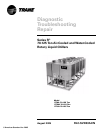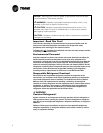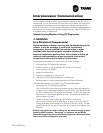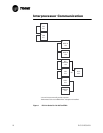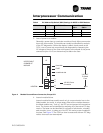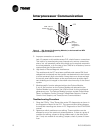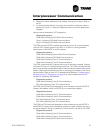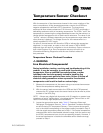
RLC-SVD03A-EN 9
Interprocessor Communication
from the Options Module. When some problem exists with the IPC link or a
module fails, it is not uncommon for more than one of these IPC diagnostics
to be displayed. Note that only those diagnostics that are indicated to be
active currently exist. All other historic diagnostics should be disregarded for
the purpose of the following troubleshooting discussion. See RTAA-IOM-4 for
a complete listing of diagnostics.
Troubleshooting Modules Using IPC Diagnostics
ƽ WARNING
Live Electrical Components!
During installation, testing, servicing and troubleshooting of this
product, it may be necessary to work with live electrical
components. Have a qualified licensed electrician or other
individual who has been properly trained in handling live
electrical components perform these tasks. Failure to follow all
electrical safety precautions when exposed to live electrical
components could result in death or serious injury.
Communication problems can result from any of the following:
1. Improperly set IPC address dip switches
2. Opens or shorts in the twisted pair IPC wiring or connectors
3. Loss of power to a module
4. Internal module failure
5. Improper connections on terminal J2
6. High levels of EMI (Electro-Magnetic Interference)
7. Module specific function selected without the Options Module.
These are discussed in more detail in the following paragraphs.
1. Improperly set IPC address dip switches:
This could result in more than one module trying to talk at the same time,
or cause the mis-addressed module to not talk at all. Only the MCSP and
the EXV modules have IPC address dip switches, found in the upper left
hand portion of the Module labeled as SW-1. The proper dip switch set-
ups are shown in Table 2.
2. Opens or shorts in the twisted pair IPC wiring or connectors:
One or more modules may be affected by an open or a short in the IPC
wiring, depending on the location of the fault in the daisy chain. The dia-
gram below shows the daisy chain order and is helpful in diagnosis of an
open link.
Extreme care should be used in making any dip switch changes or when
replacing MCSP modules. “Swapping” of addresses on the MCSPs
cannot be detected by the communication diagnostics discussed above
and serious chiller misoperation will result.



